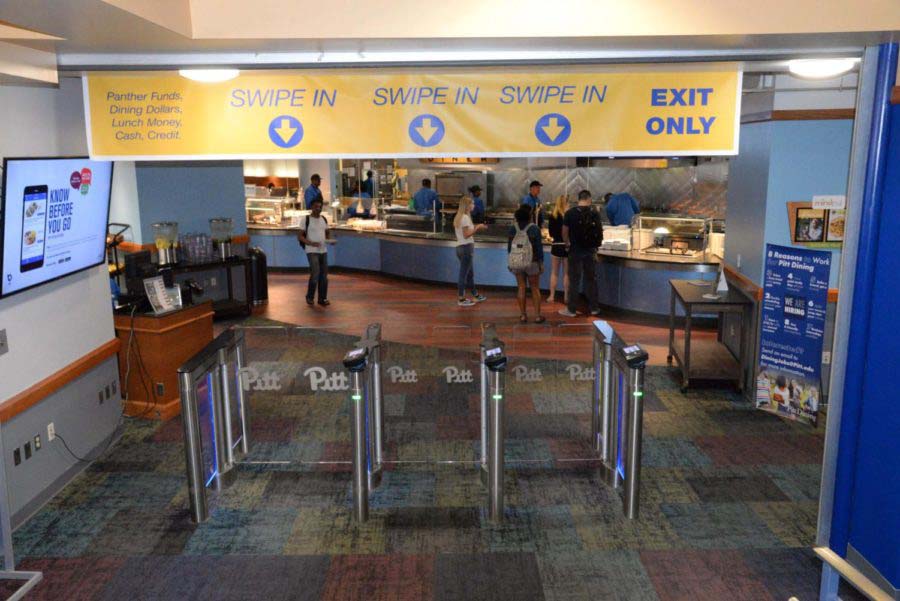The inside scoop on the dining contract negotiation process


The University’s current dining contract with Sodexo will expire this summer with a new contract starting July 1. Planning for the contract transition to a new vendor or renewal with Sodexo would take place between March and July.
Pitt Dining will have to make a decision in the next few months — not on a menu, but on who gets to make the menus.
The University’s current dining contract with Sodexo — the food management company that Pitt has partnered with for nearly 29 years — will expire this summer, with a new dining contract starting July 1. But Pitt Dining may not elect to renew its contract with Sodexo, or may choose to bring in other providers.
Pitt’s contract, which ensures that several thousand students are fed daily, consistently ranks as the largest single payment made by the University each fiscal year — it approached nearly $34 million between July 1, 2018, and June 30, 2019.
University spokesperson Kevin Zwick said a committee of students, staff members and administrators from across the University are helping to vet the companies who replied to the University’s request for proposals for the dining contract. Zwick declined to name which companies are being considered. The committee includes three students, as well as representatives from the Division of Student Affairs, Office of Admissions and Financial Aid, Office of Sustainability and several other units.
Zwick added that the vendor review process includes a variety of important criteria for the University community, such as menu diversity, sustainability, quality, innovation, value and service. Food safety — a topic of concern after a rash of numerous high-risk violations at Market Central last academic year — will also be part of the process, Zwick said.
Abdou Cole, Sodexo’s resident district manager for Pitt Dining, said it is an honor to serve the Pitt community and hopes to continue doing so.
“Sodexo is currently actively engaged in the RFP process and we hope to continue our long standing partnership,” Cole said.
The student representatives are Resident Student Association President Daniel Rudy, RSA Vice President of Finance Peter Bosco and student athlete Ryan Schonbachler. Rudy said he is using his position as RSA president to help solicit student input about campus dining services, including taking emails and comments from hall councils.
“We’ve already got a bit of a system set up to be listening to students around campus, getting feedback from the different residence halls,” Rudy, a junior math, computer science and economics triple major, said. “We’ve taken a lot of feedback just that we’ve heard anecdotally over the past couple years.”
Rudy added that since becoming involved with the committee last September, he and the other students have advocated for students’ interests in meetings, including one-on-ones with potential contractors held last October.
“I had quite a few sessions where it was just myself and the other student representatives just in a room with the different bidders, and we spent a couple of hours with each one,” Rudy said. “They would ask questions to try and get a feel for what we were looking for out of our next dining provider, so we got a lot of really great opportunities there to give the student point of view and give the students’ perspective.”
Students outside of the three on the committee have also had a chance to contribute feedback on bidders’ ideas through focus groups that were held a few weeks before the end of the fall semester.
“We got feedback on them directly — ideas of what they liked, what they didn’t … some of the background stuff as well, in addition to menu upgrades or structural changes,” Rudy said.
Julie Bannister, the assistant vice chancellor for auxiliary services, said at a University Senate committee meeting last November that Pitt planned to evaluate bid proposals last month and complete selection and contract negotiations by March. Planning for the contract transition, or renewal, would then take place between March and July, she added at the Senate Plant Utilization and Plant Committee meeting.
Zwick declined to elaborate on Bannister’s remarks.
Bannister also said at the meeting that the University was considering breaking up the multi-million dollar dining contract into smaller pieces based on specific dining services, such as sports and leisure activities, convenience and grocery stores, dining halls and premiere catering. If Pitt chooses to continue its relationship with Sodexo, it could also elect to bring in other contractors as well.
Zwick said the University is looking for the “best partnership solution” based on the University’s needs, and declined to comment further on the possibility of creating multiple smaller dining contracts.
Rudy said breaking up the contract could help provide the University with a valuable opportunity to possibly replace a contractor if they end up weaker than expected.
“I wouldn’t say we’re married to the idea of taking one provider for everything, or definitely splitting it up,” Rudy said. “It’s kind of all being considered in context.”
Rudy said the student input on the committee is emphasized, and is taken seriously by the bidders.
“That was, I know, my concern going into this, was we would be there as placeholders and a facade to have to have students there,” Rudy said. “But we definitely are being heard. We are definitely pushing for what we know students are looking for, out of these new providers.”
Recent Posts
A Good Hill to Die On // The motivation we all need
In this post of “A Good Hill to Die On,” staff writer Sierra O’Neil discusses…
Who Asked? // Is it really the damn phones?
This installment of Who Asked? by staff writer Brynn Murawski describes her brief journey limiting…
Students are ‘upset, but not surprised’ over denial of gender affirming care at UPMC CHP
Pitt students and LGBTQIA+ members express their concerns about the recent denial of gender affirming…
Take Madness Final Four | Battle of Pennsylvania, 412 and Just Outside of Philly clash
Welcome to the Final Four of Take Madness! We are down to four talented writers,…
Column | Best Sports Environments in Pittsburgh
Pittsburgh is undoubtedly one of the best sports cities in America. A deeply passionate fanbase…
Chalk is all the talk: Previewing the NCAA men’s Final Four
For the first time since 2008, all four first seeds have made the men’s Final…

